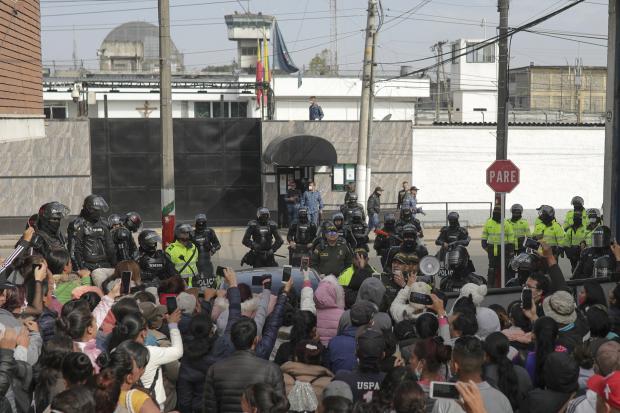23 inmates dead after protest over virus fears in Colombia

Relatives of inmates gather outside La Modelo jail in Bogota, Colombia, Sunday, March 22, 2020. Violence broke out in the prison out of inmates’ fears that authorities are not doing enough to prevent coronavirus inside prisons. (Photo by IVAN VALENCIA / AP)
BOGOTA, Colombia — A deadly riot broke out in a prison in Colombia’s capital, leaving 23 inmates dead, authorities said Sunday, as tensions rise over the spread of the coronavirus in one of the most vulnerable locations: crowded, poorly kept penitentiaries.
Justice Minister Margarita Cabello described the events at the La Modelo prison in Bogota as an attempted prison escape, but advocates for inmates said officials had cracked down on inmates staging a peaceful protest over conditions they feared would exacerbate infections with the virus.
“Today is a sad and painful day for the country,” Cabello said.
The conflict at La Modelo, which houses both suspects and convicts of crimes ranging from burglary to drug trafficking, began late Saturday evening. Inmates shared videos online showing people outside their cells, yelling as shots rang out in the distance.
“They have us abandoned here!” one inmate exclaimed. “They have us like dogs.”
Article continues after this advertisementOn Sunday, evidence of the violence was still visible: The body of one man lay face-up on a roof, dressed in bright blue shorts, white sneakers and a bloody gray sweatshirt. Family members, many wearing protective masks, gathered outside, clamoring for information.
Article continues after this advertisement“We’re desperate because we don’t know anything,” one woman cried.
Authorities did not provide a detailed account of how the inmates died, saying only that seven jail workers had also been injured, two critically. Cabello said no inmates had escaped and that to date, none had been diagnosed with coronavirus either.
“This was a criminal attempt to escape that was thwarted,” she said in a video statement.
Jhon Leon, director of Judicial Solidarity, an organization that works to improve inmate conditions, said prisoners had planned a nationwide protest Saturday evening after complaining about the dire state of jails for two weeks without getting a reply.
He said about 5,000 people housed in the jail, some of whom are kept six to a cell while others sleep in hallways. Prisoners want elderly inmates and those with preexisting conditions to be moved to other locations and be put in isolation, he said. They also want more information on whether any inmates have been tested for the coronavirus.
“This was a peaceful protest,” Leon said. “The response of authorities was overhanded.”
Colombia had confirmed 231 coronavirus cases and two deaths as of Sunday. But with notoriously overcrowded and often violent prisons, many are concerned that the virus could spread quickly there.
The government has taken a handful of initial measures, including barring relatives from visiting inmates. The penitentiary service also said it is reducing the number of workers in certain areas to create more distance between people, allowing older workers and those with preexisting conditions to stay home and organizing disinfection cleaning crews. One group of 10 inmates has been employed to create masks.
But human rights advocates want the government to go further, taking measures like freeing those about to finish their sentences or who are jailed as a preventative measure for non-violent crimes. As of early 2019, there were 120,000 inmates in Colombia’s jails, far beyond the official capacity to hold about 80,000 prisoners.
The attorney general’s office, among other institutions, has found that inmates have trouble accessing basic services like clean water.
“Colombia should take urgent action to mitigate the risks in the jails,” said José Miguel Vivanco, Americas director for Human Rights Watch.
It’s an issue for many nations in the region and around the world: With nearly 1.5 million prisoners behind bars, Latin America’s packed jails are an ideal breeding ground for disease.
In Brazil, hundreds of prisoners from several facilities in Sao Paulo state have escaped in recent days while family members of opposition activists jailed in Venezuela say they fear for their loved ones amid unconfirmed reports that four police officers at the country’s most notorious jail for political prisoners have come down sick with the illness.
In the U.S., authorities across the country have been ordering the release of non-violent offenders and restricting the number of new detainees to prevent spread of the disease. But such solutions have been slower to materialize in Latin America, where jails are frequently overcrowded and run by violent gangs.
/atm
For more news about the novel coronavirus click here.
What you need to know about Coronavirus.
For more information on COVID-19, call the DOH Hotline: (02) 86517800 local 1149/1150.
The Inquirer Foundation supports our healthcare frontliners and is still accepting cash donations to be deposited at Banco de Oro (BDO) current account #007960018860 or donate through PayMaya using this link.